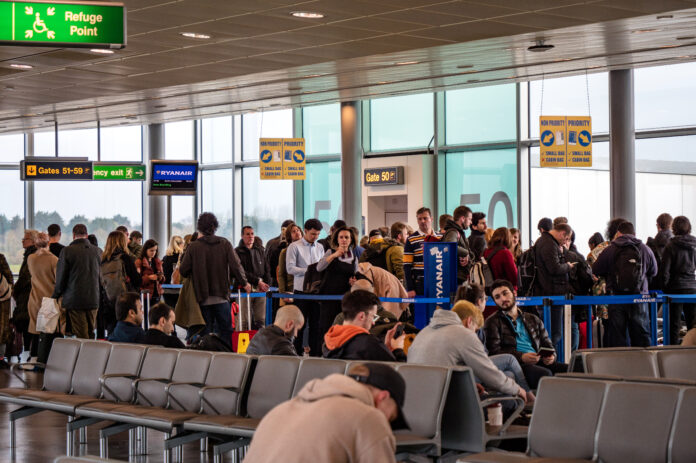Increased confidence — and countries across the world dropping Covid restrictions — has meant that holidays are back on the cards for many Brits for the first time since the pandemic. But it seems this big surge in demand has surprised airlines and airports, which have been slow to reawaken from their dormancy. The result? Massive queues at airports, long delays on arrival and flights cancelled at the very last minute.
Figures from the trade body Abta found that 70 per cent of British families are planning a holiday this summer. But there’s still so much to consider before booking and travelling, especially during a once-in-a-generation cost-of-living crisis.
That’s why we’ve answered the 19 key questions from readers and the industry about the state of travel right now, as well as directing you to Q&As and analysis on all the hot topics, from saving money while abroad to the travel insurance policy you need to take out. We’ve also got guides to our most popular holiday destinations such as Greece and Spain, and detailed round-ups of what you should do while there. We’re calling it our summer survival guide: a one-stop shop for everything you need to know about travel over the next few months. After the past two years, we all deserve a summer holiday.
Main photo: the steps leading down to Praia do Camilo, near Lagos, in the Algarve (Getty Images)
*This article contains affiliate links.
All products and brands mentioned in this article are selected by our writers and editors based on first-hand experience or customer feedback. We feature properties from a specially selected list of trusted operators who are of a standard that we believe our readers expect. This article contains links which are ads and if you click on a link and buy a product we will earn revenue. These links are signposted with an asterisk. The revenue generated will help us to support the content of this website and to continue to invest in our award-winning journalism.
Show more
Show less
1. What’s causing the travel chaos?
Both airlines and airports have blamed the issue on Covid. During the lull in the last two years, the air travel industry laid off tens of thousands of staff. But unlike other travel sectors, rehiring them isn’t quite as straightforward. The hiring process itself takes several weeks, during which any potential candidates are thoroughly vetted for security reasons, and then they have to go through training that takes several more weeks. Adding fuel to the fire is the fact that many of those who were laid off have since left the industry, and the often low salaries are not exactly tempting.
Unfortunately, it’s hard to say how long this chaos will continue. All parties involved are on big hiring drives to try to secure enough staff for the summer season, but given it’s already been a couple of months since the first spate of cancellations, an improvement in the next few weeks doesn’t seem that likely. A couple of months down the line? Perhaps.
Queueing for a Ryanair flight (Alamy)
2. Should I be booking flights earlier than usual?
This depends on where you’re travelling to, who you’re flying with and when.
Rob Burgess, editor of frequent-flyer website headforpoints.com, says: “With the low-cost carriers, the usual trend of prices increasing nearer departure will continue so waiting could be expensive.”
However, on some routes, it’s well worth waiting to see whether prices drop when availability increases, according to Burgess.
He says: “BA has not yet published its November to March short-haul schedule for Gatwick. I wouldn’t recommend, for example, booking expensive ski flights from Heathrow for next winter, as I expect Gatwick routes to be added alongside them in the coming months.”
Read our guide to finding cheap flights here.

3. Will the cost of my trip go up?
The rising cost of fuel due to the war in Ukraine could push up the cost of holidays in the near future — and it could affect you even if you’ve already paid in full.
In the case of package holidays, this is known as a holiday surcharge, and can be due to currency fluctuations as well as rising fuel costs. Package providers are allowed to charge a maximum of an extra eight per cent of the total cost of your holiday, but they can only do this if they tell you at least 20 days before your departure. If they want to charge more, they must give you the right to cancel with a full refund.
Cruise lines are also known to ask for fuel surcharges, even after you’ve paid in full. How much they can ask for will be written in the terms and conditions of your booking and varies from company to company.
Airlines can add fuel surcharges as well, but these are always applied at the point of payment so at least you won’t have to worry about a surprise bill there. On arrival at your destination, you may in some cases still need to pay outstanding airport taxes that aren’t included in your fare — although this is very rare.
For those who haven’t travelled in a while, a number of destinations have introduced new tourist taxes aimed at helping to make tourism more manageable. The money might be used for conservation, for example, or to provide toilet facilities. Venice has pushed back its €10 day-tripper tax again to 2023 — you already need to pay one if you stay overnight — while Thailand is said to be introducing one in August this year.

4. How long do I need left on my passport before I travel?
This depends on where you’re travelling to, so check before you book. For Turkey, for example, you’ll need at least six months left on your passport; the US will allow you to enter as long as your passport is valid for the duration of your stay.
For EU and EFTA countries (Iceland, Liechtenstein, Norway and Switzerland), your passport needs to be less than ten years old when you enter the country and have at least three months left on it on the day after you leave. The only exception here is Ireland, where you can travel up to the day your passport expires, as it’s part of the Common Travel Area with the UK.
Read more about passport validity for Europe here.
5. Do I need a visa to travel to Europe?
If you’re travelling as a tourist, no. For work or to study, you may need a visa — it’s best to check with the embassy of the country you’re planning to travel to for the latest guidance on this.
If you’re visiting an EU country, you can only stay for 90 days out of 180 without getting a visa and this number is cumulative across all EU member states. From May 2023, you’ll need to register using the European Travel Information and Authorisation System (Etias) before you travel, even if it’s just for tourism purposes. This will cost €7.
You can find out about more about travelling to Europe after Brexit here.
6. Which countries still require Covid tests for entry?
Covid entry requirements vary from country to country and may depend on whether you’re vaccinated and have received a booster jab, so check with the relevant health department before you travel. While many destinations have relaxed their entry requirements for vaccinated travellers, some still require additional testing before entry. These include the US, Anguilla, the Bahamas, Bermuda and New Zealand. If you’re unvaccinated, there are plenty of places you can visit.
See the full list of countries that don’t require vaccination or quarantine here.

7. What happens if I get a positive test a few days before I fly?
If you recently had Covid but have since recovered, you may still test positive. In this case, some destinations will permit entry as long as you have a Covid recovery certificate. Your NHS Covid Pass will show details of any previous Covid infection (provided you reported it to the NHS), although this may not be accepted everywhere. Some private companies will issue dedicated Covid recovery certificates as an alternative. Always check the requirements with the embassy or health department of your intended destination.
If you still have Covid, and assuming you need a negative Covid test before you travel, you’ll need to check the terms and conditions of your booking. Some travel providers will allow you to rebook your holiday on a different day or cancel and get a refund — but be prepared to accept that some elements of your trip might be non-refundable, such as entry to a national park. You may also be covered under your travel insurance, which you could turn to if you’re not able to secure a refund from your travel provider.
Find out what you need to know if you test positive for Covid while on holiday here.
8. Will I need a fourth booster to travel?
Not at the moment. However, there are a number of destinations that do require at least one booster jab for you to be considered fully vaccinated, if it has been six months or more since your original course of vaccination.
Read more about booster jab requirements for travel here.

9. Where should I avoid given the crisis in Ukraine?
“Travellers should always follow guidance from the UK government on where it’s safe to visit,” says Rory Boland, editor of Which? Travel. At the moment, the Foreign Office advises against travelling to Russia, Ukraine, Belarus and Transnistria in Moldova due to the war in Ukraine. It also advises against crossing any borders from Poland, Slovakia, Hungary, Romania and Moldova into Ukraine.
Visiting Ukraine’s neighbouring countries could be helpful in some cases, says Boland. “The instinct may be to avoid Ukraine’s neighbours, but if you’re looking for somewhere to go, Krakow is 1,000km from Odessa and the warm-hearted Polish city deserves our support after welcoming more than 150,000 refugees.
“The Polish government has repeatedly asked that people do come and visit, because the pounds they spend help the Polish wait staff, hoteliers and tour guides who are housing and feeding Ukrainians.”
The tourist boards of Ukraine’s neighbours would be the best source of current guidance for this.
If you’re flying to Asia, be aware that some routes have been cancelled and others are taking significantly longer, as airlines are having to deviate from their usual route to avoid Russian, Ukrainian and Belarusian air space. This may in turn affect air fares.
Read more on how the war in Ukraine can affect travel here.

10. How do I save money on a holiday this summer?
If you’re booking a package break, the holidays in the first weeks of summer are always more expensive, but prices tend to drop significantly during the last week of August, even though the weather is still glorious and schools haven’t yet started for some. You can also generally make a saving if you are flexible about when you’re travelling — by setting off on a Monday instead of a Saturday, for example.
Chelsea Dickenson, founder of Cheap Holiday Expert, suggests trying home swapping or house sitting as an alternative.
She said: “LoveHomeSwap.com is a fantastic website that allows you to swap your home with someone else for the ultimate value getaway. Use their free trial to try and bag a stay so that you don’t have to pay membership unless you have a swap lined up.
“Nomador.com is a house-sitting website with a totally free membership option so it’s a great place to get started on your house-sitting journey.”
You can find more budget travel tips here.

11. Which country will be most affordable for a family holiday this summer?
Dickenson recommends heading inland and avoiding the coast as a general rule, and also opting for less popular — but no less beautiful — destinations.
She said: “For me, it’s all about heading somewhere that has a lower cost of living compared to the UK so that you can treat yourself when away — even if you’re on a budget. While less traditional summer destinations, Poland and Romania are incredible options for modern cities and stunning countryside. After a bit of coastline? Montenegro, Croatia and Portugal all offer great value for money too.
“Also, don’t rule out city breaks. Madrid and Berlin are surprisingly affordable in the summer and they both offer lots of family-friendly options — though make sure you’re booking somewhere with air conditioning.
“If you’re still desperate to head to popular destinations such as Spain or Greece, I’d recommend avoiding islands and heading inland instead. Think countryside and mountains rather than the coast.”
See the best value destinations for 2022 here.
12. Which are the best value companies to book with?
For package holidays abroad, Tui is currently the biggest provider although their prices tend to be a bit higher than competitors during school holidays. That said, they do have sales throughout the year and if you manage to find a free children’s place on top then it is possible to secure a bargain. When you find something, it’s worth doing a comparison with First Choice (owned by the same parent company) as prices can sometimes be different.
Otherwise Jet2 Holidays offers fantastic value for money as their usually competitive prices include flights, accommodation, transfers and checked luggage. EasyJet Holidays has comparable deals, although they’re currently experiencing a high volume of flight cancellations.
For weekend breaks, try BA Holidays. They offer exceptional value for money for couples — think under £150 per person for two night breaks with flights and luggage in a four or five star hotel — especially if you’re flexible about where you go. Use the Holiday Finder to search for the best deal.
Towards the luxury end of the spectrum, Kuoni and Trailfinders have both been recommended by Which? Travel and are able to offer tailor made itineraries. Plus, as they have flexible booking policies, it’s much easier to change your travel plans.
In the UK, Sykes Cottages have a good spread of lovely properties across the country and you can usually find a good deal last minute. You can also stay in a National Trust managed cottage — they can be pretty basic in some cases but offer plenty of character and you’ll get free entry to a nearby National Trust property as part of your stay.
Read about companies that offer flexible booking policies here.
13. Will I have to pay more for car hire?
Very probably. Many car hire firms sold their vehicles to cut costs during lockdowns and have yet to rebuild their fleet. A shortage of cars plus high demand will inevitably lead to higher prices. It’s also worth booking your hire car well in advance to ensure there’s availability, as popular spots are sure to sell out.
14. What happens if I miss my flight due to queues at the airport?
It depends on the airline you’re flying with, and in some cases whether the queue was down to the airline (at baggage check, for example) or the airport (security queues or border control). In either case, check the terms and conditions on your ticket and speak with your airline first.
British Airways (see “events beyond your control” section) and Virgin Atlantic will both try to rebook you on the next available flight for free. EasyJet will allow you to transfer to the next available flight for a “rescue fee” of £110, provided you can prove you arrived at the airport within two hours of the scheduled departure time. Ryanair will charge you £100 to move onto the next available flight if you go to the ticket desk within an hour of the scheduled departure time of your original flight.

15. Should I arrive at the airport earlier than usual?
According to Rory Boland of Which? Travel, the answer is no.
He said: “Airports know how many passengers there will be each day and how many staff there are, roughly. So they should give passengers a concrete time to the hour to arrive to prevent the situation we have at the moment, where people understandably feel compelled to turn up many hours early, which is making the queue problem worse.”
Guidance on timings is usually found on the airport’s website and is generally between two to three hours. However, you may also receive emails from your airline to advise different timings. If so, this is the advice to follow.
Rob Burgess of headforpoints.com suggests: “If your airline or airport allows you to drop your bags the night before, as BA does at Gatwick, this can be worth it. Pay £5 per person online for Premium Security and you should be able to waltz through Gatwick the next day in under ten minutes.”
16. Why are flights being cancelled and can I get my money back?
Most of the recent cancellations have been blamed on Covid. Both airlines and airports have struggled to recruit sufficient staff to meet the overwhelming demand for foreign holidays — this has led to long queues at check-in and security, as well as cancellations due to a shortage of crew. Over the Jubilee bank holiday weekend, there were also a number of flights cancelled due to bad weather.
You may be entitled to a refund as well as compensation if your flight is delayed or cancelled, but it depends on the situation.
You can find all the details about how to get your money back, including how to make a claim, here.
17. Will travel insurance cover me if my holiday gets cancelled?
If you booked a package holiday and the travel firm cancels your break, you are entitled to a full refund by law. However, if you booked your flights and accommodation separately, your rights to a refund will be different. For example, if your airline cancels your flight and you decide not to continue your journey, the airline is not obliged to refund you for your accommodation.
In this case — and also if you decide to cancel your holiday yourself for whatever reason — you may be able to make a claim through your travel insurance provider. Whether this is possible and how much you get back will depend on the level of coverage you’ve taken out and the circumstances of the cancellation so it’s best to check the terms and conditions of your policy.
Some of the most comprehensive travel insurance providers include AA and Abta. The Times Money Mentor has a full list of expert-rated insurance providers.
You can read more about how travel insurance might be able to protect you here.

18. Which airlines are most affected by delays and cancellations?
EasyJet is currently the most heavily affected airline, having cancelled hundreds of flights during each of the school holidays. British Airways also cancelled hundreds of flights earlier this year but since trimming its schedule around Easter, it hasn’t suffered any mass cancellations. Tui recently cancelled about a quarter of its flights departing from Manchester Airport throughout June, but its other services don’t seem to have been affected.
Get inspired with our guides to top summer destinations

Spain
• Spain travel guide
• Best Spain tours
• Best places to visit in Spain
• Best villas in Spain
Need to know Proof of full vaccination (booster may be necessary) or negative Covid test before entry. See more here.

Greece
• Greece travel guide
• Best family hotels in Greece
• Best all-inclusive hotels in Greece
• Best places to visit in Greece
Need to know No entry restrictions but masks are still required on public transport. See more here.

Italy
• Italy travel guide
• Best places to visit in Italy
• Best villas in Italy
• Best beach holidays in Italy
Need to know: No entry restrictions but FFP2 masks must be worn on inbound flight. See more here.

France
• France travel guide
• Best things to do in France
• Best villas in France
• Best boutique hotels in Paris
Need to know Proof of full vaccination (booster may be necessary) or negative Covid test before entry. See more here.

Turkey
• Turkey travel guide
• Best places to visit in Turkey
• Best hotels in Turkey
• Best family hotels in Turkey
Need to know Proof of full vaccination or negative Covid test before entry. See more here.










